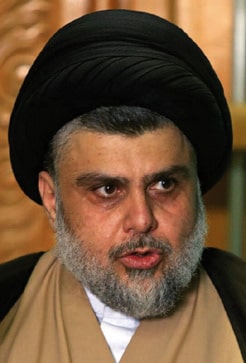The son of the late Grand Ayatollah Mohammad Sadiq Al-Sadr, and son-in-law of Grand Ayatollah Muhammad Baqir Al-Sadr, Muqtada is a highly influential leader who inherited control over large social institutions that serve millions in the slums of Baghdad.
Birth: 4 August 1974 (Age: 51)
Source of Influence: Political
Influence: Political, Social Issues
School of Thought: Shi‘a
Status: Featured in current year
The son of the late Grand Ayatollah Mohammad Sadiq Al-Sadr, and son-in-law of Grand Ayatollah Muhammad Baqir Al-Sadr, Muqtada is a highly influential leader who inherited control over large social institutions that serve millions in the slums of Baghdad.
Serving the Poor: He has focussed on serving Iraq’s poor Shia Muslims and has had complete freedom to work in many parts of Iraq, especially Sadr City, a district in Baghdad named after his father. He provides access to healthcare, food, and clean water. He has raised issues of corruption, high unemployment and poor government services.
Politics: He gained prominence after the US invasion of Iraq by creating the Mahdi Army, an armed insurgency movement that formed its own courts and system of law enforcement. This is now known as Saraya Al-Salam. Through it he has concentrated on campaigning against corruption in Iraq, criticising the government openly about this. He has worked for Shia-Sunni unity, and in 2017 called for Syrian president Bashar Al-Assad to step down, and also met with Saudi Crown Prince Mohammed bin Salman.
Power-Broker: The Sadirist-led coalition won 73 seats in the 2021 elections, beating the Iranian-backed coalition, but he was unable to form a government, and so Sadr withdrew his coalition and quit politics a year later. There were violent clashes between the supporters of the two coalitions which led to fears of an all-out, intra-Shia civil war, but Sadr played a prominent role in preventing this. He still influences policies through his power on the streets. With parliamentary elections in 2025, there are signs that he will re-enter the political field.
News about Muqtada Sadr
- No approved news items yet.



